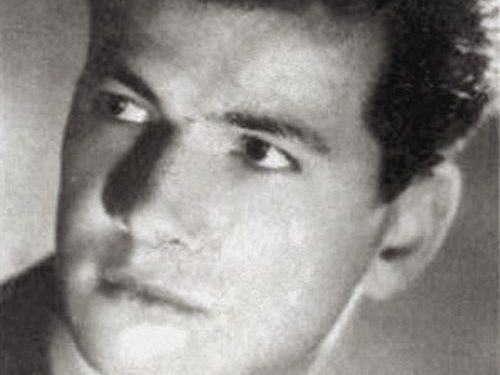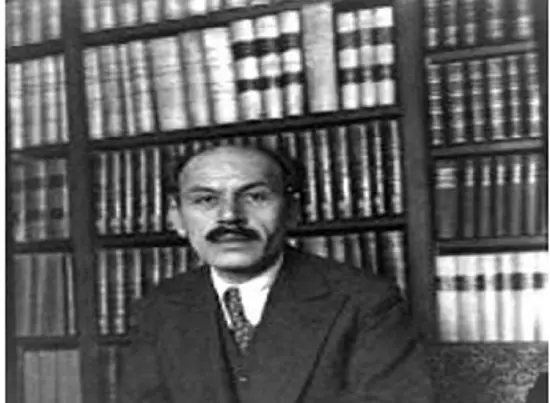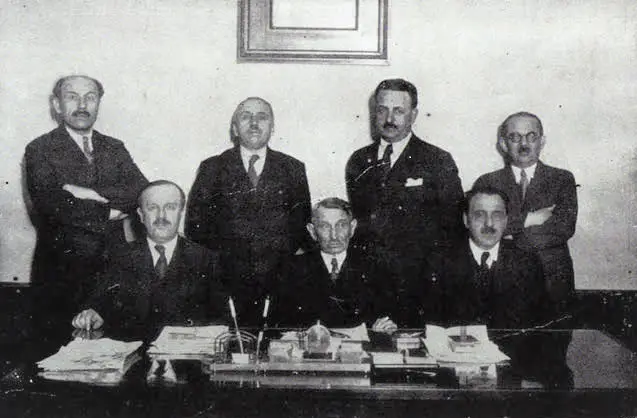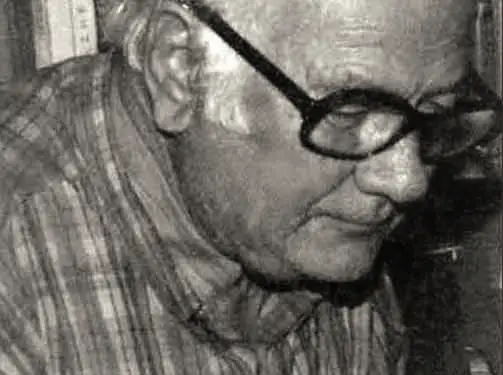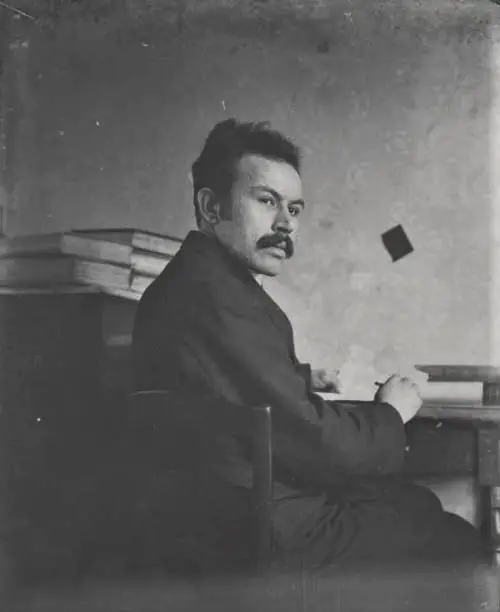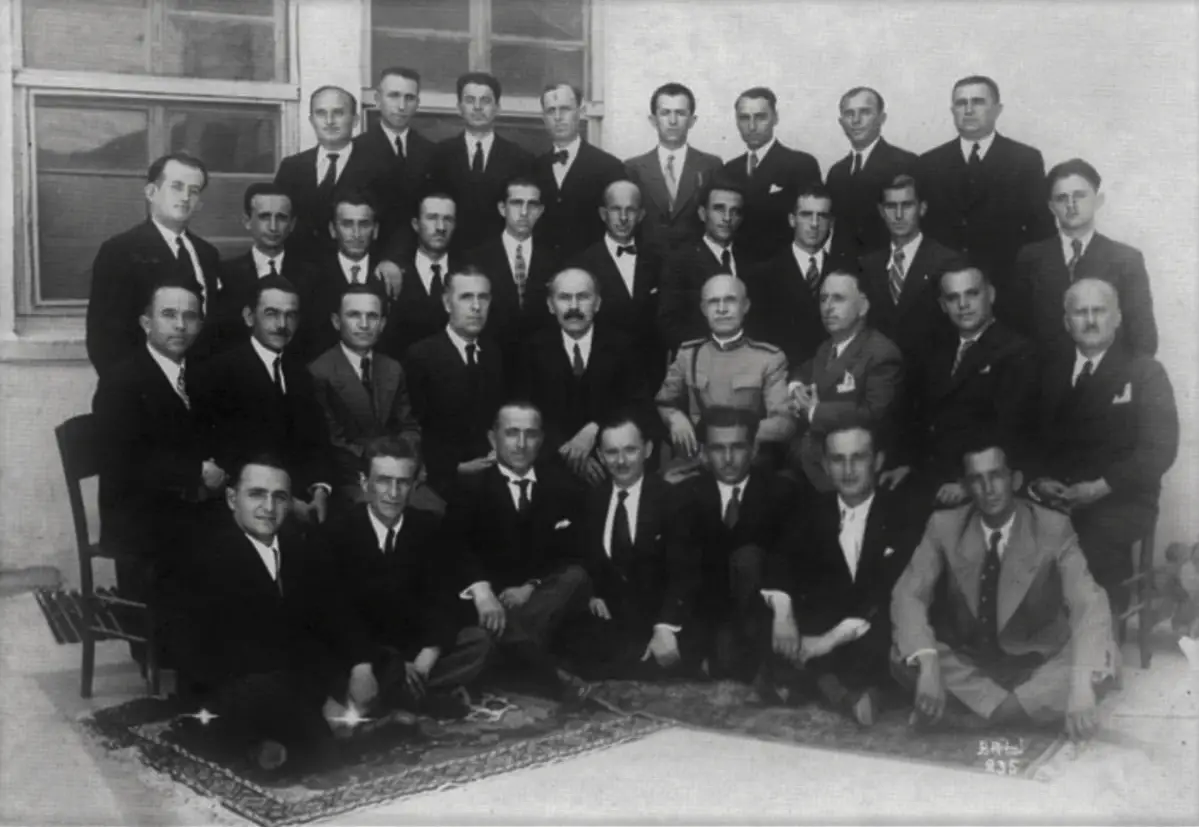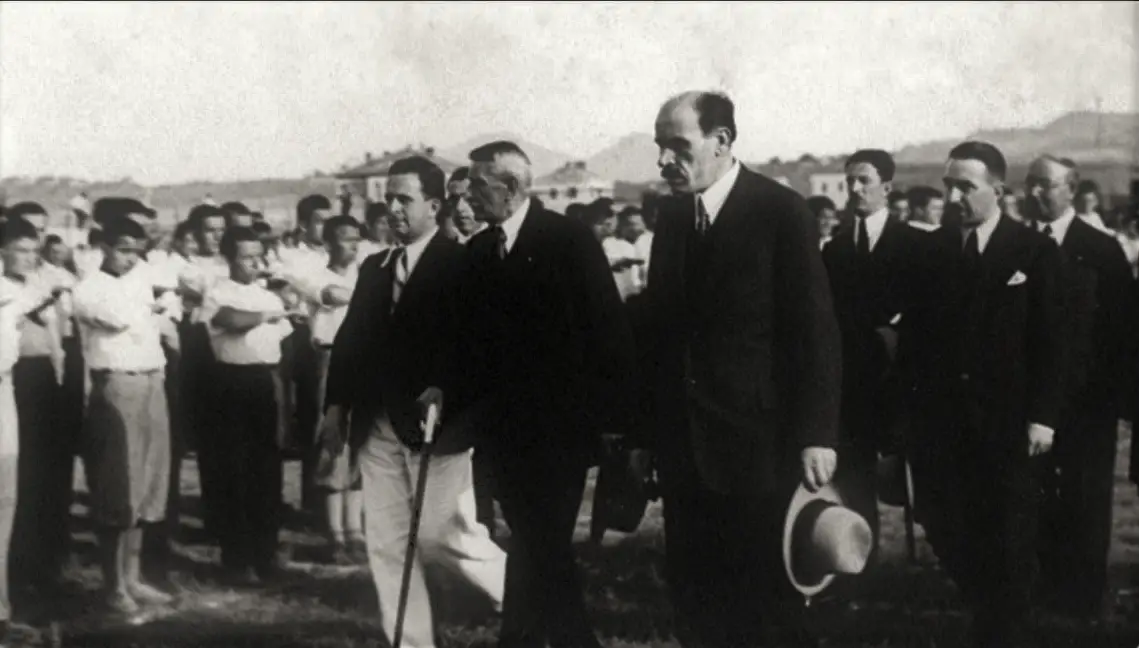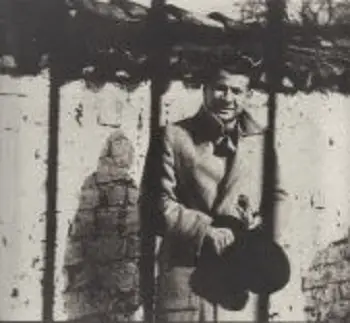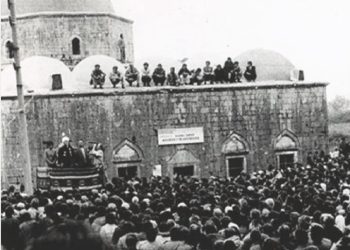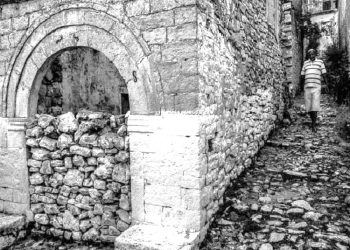By Lazar Radi
The first part
Memorie.al / Lazër Radi were born in Prizren on January 29, 1916, in a family with early origins from Mirdita. He attended primary school and three years of high school in his hometown in the years 1922-1929. At the beginning of the 30s, the Radi family moved from Kosovo and settled first in Tirana and then in Durrës. In 1930, Lazri began his studies at the Tirana high school and in 1931; he was awarded a state scholarship by the Minister of Education, Hilë Mosi, to the Shkodra high school, in the dormitory “Malet Tona. He spent the summer of 1936 at the summer school in Puka, where his sister taught, and there Lazri met the well-known poet, Migjeni. In 1938, he started studying Law at “La Sapienza” University in Rome and in 1942; he graduated with high marks in the Philosophy of Law. After graduation, he was invited as an assistant professor in the chair of prof. Vito Cesarini Sforza, however, decided to return to his homeland in 1942, and began his law practice at the Golgota law firm in Durrës. During the period 1942-’44, he worked as a secretary at the office of Housing for foreigners. Contributes for more than a year to the newspaper “Bashkimi i Kombit” under the pseudonym “Ushtima e Sharri”. In 1944, he received his lawyer’s license and began to practice his profession until November 23, 1944, when he was arrested by Enver Hoxha’s partisan forces. After several months of investigation in Tirana prison, he was tried on April 13, 1945, in the “Special Court”, where he was sentenced to 30 years in prison, accused of his involvement in politics through journalism. He served his sentence in the years 1944-1954, in various camps and prisons, (where he shared a cell with Mirash Ivanaj, Petro Marko, Jusuf Vrioni, etc.), where he spent most of his time translating. In 1952, his wife was also arrested (after the bomb incident at the Soviet embassy), who was initially sentenced to ten years in prison and forced labor, but was later reduced to five years after being diagnosed with TB. In 1954, he was released from prison, and less than two weeks later, he was interned first in Savër in Lushnje and then in Shtyllas e Radostine in Fier, then in Kuči i Kurvelesi camp, where he stayed until 1958. In the years 1958-1960, he continued to be interned in the camps of Gradishta and Čerma, and in the years 1960-1990, for more than 30 years in a row, he lived with his family in the Savra camp, where he worked as a mechanic, bricklayer, carpenter, ironworker and designer, with the camp painter Lek Pervizin. In 1974, he was transferred to agriculture as a laborer, until he retired on October 8, 1976. In 1982, he was publicly exposed as “Enemy of the people” and, dissatisfied with the communist regime, he risked being imprisoned again. In 1990, he returned to Tirana and became active both in politics and with various articles in the press of the time, and by writing books. In 1998, after the exile of his children, the death of his wife on March 21, 1997 and the deterioration of his health, he passed away in Tirana on the morning of September 22. On September 23, the Association of Former Political Prisoners and Persecuted organized a grand funeral. With the events of 1997, he sent the books he had published during this period to his friend in Brussels, Lek Pervizi, with the order to “keep them because communism was being restored again in Albania…”! From 2018, the publication of the “Complete Works of Lazër Radi” column began, under the auspices of his son, Jozef Radi, which includes 15 of his works as an author and 9 translated works, which ended in 2021 and was promoted at the 2021 Book Fair. The writing we have selected for publication here is taken from his memories of the period of suffering in camps and prisons, as well as what his fellow sufferers have told him.
– THE LAST YEARS OF MIRAS IVANaj –
Early days in prison (Ibrahim Hasnai tells)
In the last days of December 1947, after we were isolated for ten months under the barrage of inhuman torture of the investigation by the Communist State Security, we were brought to the high military court. We were a group of prisoners of eighteen defendants. The accusation that was given to us was the same for everyone: “They tried to create committees and sub-committees for the re-creation of the ‘National Front’.”
Eleven people were sentenced to death in this trial, seven of whom were shot, while the other four were sentenced to life imprisonment a few days later. The unfortunates who had the risk of being shot during the first days of January 1948 (January 7-8) were: Islam Radovicka, Ilmi Hysi, Uan Filipi, Riza Dani, Syrja Selfo, Hasan Reçi and Faik Shehu (This trial, in the painful history of fake trials organized by the communist Security, it is called “Trial of political convicts, headed by Islam Radovicka”).
When I was isolated, I was given the painful fate of being sent for nearly three months to an unforgettable cell with my childhood friend, the intellectual from Tirana, Xhemal Farka, who had told me a lot about the great figure of Mirash Ivanaj, even, had told me in detail about the last meeting he had at the “Wailing Wall” in Jerusalem. Although I had some knowledge about this great figure of the Albanian society, but Xhemali, with his stories, made me listen with an unlimited love and appreciation for the colossus Mirash Ivanaj.
When I was brought to the old prison of Tirana, I found young Sul Dizdari as a barber to shave and shave the prisoners. It was an impossible thing for Sula to bear to shave the endless multitude of people who were sent to the Tirana prison, and since he knew me and knew well that I had enough knowledge for this profession, he made a request to the prison directorate that, to take me as his assistant. After a few days, they took into account his request and I started working as a barber to serve the prisoners.
I couldn’t wait for the opportunity to serve Mirash Ivanaj. One day this case came to me. As soon as I started to serve him, I addressed him in a low voice:
– Mr. Ivanaj, I stayed for almost three months in a cell with the late Xhemal Farka, who told me a lot about you…!
At that moment he stopped my hand, giving me a searching look and asked me:
– Yes, hey, what did he tell you?
– He told me that you had met for the last time in Jerusalem at the “Wailing Wall”, where Xhemali had been accompanied by a Jewish boy from Jerusalem with whom he was a student at the American University of Beirut…!
– Okay, that’s right! – he answered in his low voice.
The days passed and our friendship grew more and more when I told him that I liked literature and especially poetry.
– Some of my poems you will have the kindness to look at and check.
In order not to spoil my fun, he accepted this wish, but you understood that at first he took me as a dilettante, a gambler, suffering from the mania of becoming a poet…!
One day I gave him my poems to read, there were three that I had written in the prison of Tirana, in March of 1948, entitled “I am accused”, “In dubio prorero habetur” and “Det ofshamësh”. When he returned them to me, he smiled sweetly and encouraging me, he said to me:
– Good luck!
After a few weeks, we were separated from each other because I, along with many other fellow sufferers, was sent to the camp of the Maliqi swamp (Orman-Pojan).
In the winter of 1949, they returned to Tirana prison. On this occasion, I had the good fortune to see and meet Mirash Ivanaj again, where, without wasting time, I gave him a look at a bunch of poems written in the labor camp entitled: “Poet’s World”, “My Tear” , “Cage”, “A ray of sunshine”, “Predestinate”, “Me and my feelings” – persistently begging him to write me a line with his own hand…!
-Good! I’m not spoiling the fun!
After reading them, he wrote me a few lines.
I received the letter with the valuable remarks and advice he gave me; then we didn’t see each other anymore because, from that moment on, I was sent to Lizhavec camp (Malik swamp).
In 1961, after I was released from prison, I was sent to the village of Radostina in Fier. During the time of internment, I learned the bitter news of the death of Mirash Ivanaj. Bile, in the camp I learned that they had left him dead in the morgue for a few days. Then, instead of being given even a simple burial ceremony – as he deserved it by all rights – he ended up on the table of anatomical experimentation for medical students. I was extremely saddened for this high figure of the Albanian society, for this tragic ending.
The death of Professor Mirash Ivanaj in the prison hospital
…I took Mirashi to the hospital! After a few days we got the news that the Professor died! You don’t know anything. Like White? How was he treated? Did he suffer a lot? Was anyone nearby at the time of death? Who would answer us? Which one should we ask?
We should consider this painful and tragic event as a closed chapter. This for us was an ordinary death in prison, covered by all the silences guaranteed by the Security.
Later, in the years of internment, I decided to write the memories I had with Professor Mirashi during the prison years, where fate wanted us to be together and close both at work and in sleep. Of course, the description would end the moment I got him in the ambulance and drove him to the hospital… while I went back to the ward to continue working.
One day in 1991, in the newspaper ‘Rilindja Demokratike’ dated August 28, 1991, on page 3, I read a poem with the title: “Farewell to life, farewell to the world” – given to Agron Çarçan in prison, even this political prisoner, in that time admitted to the hospital-prison for an appendicitis operation.
At all costs, I had to find this man and ask him about the last moments of the Professor’s life. With great difficulty, I finally found it. From the first conversation I had the impression that he was a good, honest and above all simple man. From a cultural point of view, there was no preparation…! This side seemed to make me believe in the reality of his story, in the sincerity and truthfulness of the narration.
Having no cultural preparation, in the story, he limited himself to the simple presentation of what he had seen with his own eyes, without any objection or reflection. So, with a completely naive story, we will be able to assist in the Professor’s suffering in the moments of death.
Agron Charçani tells…
It was the first fall of 1953. I was hospitalized in the Tirana prison hospital. It had been 10 days since I had been hospitalized and 8 days since I had been operated on for appendicitis. That day, in the morning, they took off my shoes. I felt pretty good and was able to move around the room. Not only was I able to move freely, but I was also able to give a little help to two other friends who were laid up with me and who were older and sicker than me.
Lunch is coming!
None of us had an hour, but breakfast, lunch and dinner were served from a wheelbarrow that the sanitary attendant brought to the corridor where, on a table, she distributed the food among the plates and after completing all the rations, opened the doors and began to serve us. .
Our room had 4 beds. One of them always stood empty ready to await any emergency that might come to us from the prison. Two other prisoners were also laid up in that room. One was called Ndue Gëziqi and was from Mirdita, the other was very old and suffered from prostate. Since he refused to do the operation, he would be discharged from the hospital the next day.
After lunch, I got up and sat next to Ndoi’s bed and we were dealing with “gossip”, as prisoners usually do…!
Suddenly the door opens and the prison commander and nurse Njaziu appear. Njaziu was holding two washed sheets and a pillow case. The commandant, who saw me wandering around the room, ordered me to make the empty bed, as they had announced that a prisoner would be laid to rest. Without properly finishing the arrangement of the bed when the patient is ready. He was huge from the body but very weak!
Two nurses were holding him by the arm. I recognized him! Oh God, how weak he was! It was Professor Mirash Ivanaj. How sick he was! He could not stand on his own feet. Leaning on the nurses, he was walking with bent legs as if they were broken. I approached him and called his name. He didn’t react at all. No answer. As if my voice had not reached his ears. He kept his head hanging. The professor was sick, it was very serious…!
With the help of the nurses, we laid him on the bed. Despite all the hardships he suffered there with us, not a single moan came out of his mouth. Even that short trip from the ‘New Prison’ to the hospital had aggravated him and added to his pain. I saw that he needed peace and solitude. He didn’t want anyone to talk to him. He needed to pick himself up a bit!
I also lay in my bed thinking and feeling sorry for the Professor. It was clear from his face and attitude that he had very little hope of staying alive. While I was wandering through these gloomy and confused thoughts, the door of the room opened again, and three people entered: it was the commander and two other officers, one of whom was in civilian clothes, behind them, hurrying, came two doctors, whom I was seeing for the first time.
That everyone gathered around the Professor’s bed and, for any complication, I had to alert the inner guard. From the hushed conversations of the officers and doctors, I noticed that they had been instructed to take special care of his recovery as soon as possible…! One of the officers was called Manol. This very preoccupied, said that “everything should be done to heal him: we need him very much”.
The door opened again and the nurse, Njaziu, entered with a high-dose injection needle in his hand and approached the professor’s bed. I asked the nurse if she needed me. He told me: “Come closer and bring the pillow with you, because we will support his arm.”
The injection went well. The professor was not mentioned at all. Another needle would be made later. The professor needed food. As for the food, the nurse told me that they would only bring him yogurt and compost juice. I had to carefully scoop it with a spoon. Something was messed up in the stomach or between the intestines. It was thought to do all the tests completely.
In fact, the Professor did put anything in his mouth: neither dry nor liquid. He had an aversion as if he could not look at any kind of food.
– Let him rest, – Ndou told me!
– Come on, Professor Ivanaj, it’s too heavy! I am afraid that this prolonged coma will endanger him.
– I’m afraid so: even his face is dead…!
This pissed me off even more! I couldn’t sleep all night. I kept bugging him. I was hoping that he would come to his senses and say a word. There, in the fading light, with some nervous gestures, he made some signs to me. From what I understood he needed to go to the bathroom.
Ndou and I were happy because he moved and let out something like a sound from his mouth. He was unable to move and walk to the bathroom. We brought the potty to him and tried to turn him a little to the side.
It was impossible to fill his mind! He must have asked to go to the bathroom. We thought that he might have a great need and it was difficult for him to do it right there in front of our eyes! We lifted him from the bed and put him on his feet: his legs could not support him. It was better to grab her by the arm and carry her to the toilet by my side. He didn’t even weigh 30 kilograms.
He didn’t even accept it! Mountain head! Then we grabbed him by the arms and took him to the bathroom. On the way, he told us in a hoarse voice:
– Eh! There is no more life for me! Everything is over!
We tried to cheer him up, to encourage him, to convince him that he should not lose hope. I started to tell him that I heard with my ears the officers and doctors who were talking among themselves and were saying:
– It must be cured. It is very necessary…
Then the professor felt as if his mouth came and, being extremely surprised, he whispered to us:
Although in the bracket I heard their conversation. They talked in vain. No one is in control of human life, except the great God…!
…The nurse ordered us to get him ready because they would take him on a stretcher to check his stomach and heart.
When we started, Ndou and I were left alone. He told me:
– Did you see how he speaks? His tongue has thickened. We say that the first sign of death is the thickening of the tongue. Then, I wonder why they are torturing him like this. He has reached such a state that he cannot tolerate even simple treatments and no more operations. He must have something in his gut because I mistakenly touched his stomach a bit and he reacted with a loud growl. Memorie.al
The next issue follows




